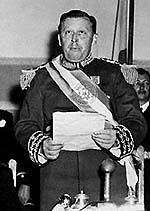Something's up with the commenting system at Waggish, so consider this a displaced comment: I'm not convinced by the notion that Bolaño and Roa Bastos, or indeed "Latin American writers" in general, are more "visceral" than other authors. (NB there is something at best quaint about describing Coetzee as English and Grass as West German.) As well as suffering all the usual weaknesses of such sweeping comments, and as well as buying in to the traditional neo-colonial ideology that allocates theory to the metropolis and corporeality to the periphery, the choice of Roa Bastos as an example is simply bizarre.
Roa Bastos's masterpiece Yo, el supremo is many things, among them probably the greatest novel written in twentieth-century Latin America. But to imply it is untheoretical is nonsense. And to label it "visceral" is, well, at best misleading.
 The novel opens with the declaration that also serves as the book's title: "Yo el supremo Dictador de la Republica" (7). This sentence would appear to be the first line of an official declaration, marked by its performative invocation of authority. "Yo el supremo" refers to the ultimate power in Paraguay, José Gaspar Rodríguez Francia, and the phrase apparently initiates another of his dictates to the Paraguayan people.
The novel opens with the declaration that also serves as the book's title: "Yo el supremo Dictador de la Republica" (7). This sentence would appear to be the first line of an official declaration, marked by its performative invocation of authority. "Yo el supremo" refers to the ultimate power in Paraguay, José Gaspar Rodríguez Francia, and the phrase apparently initiates another of his dictates to the Paraguayan people. It soon becomes evident, however, that authority and authorship are here more muddled and uncertain than first appearances suggest. For the declaration is fake--a subversive parody--pinned by unknown hands on Asunción's cathedral door. Who then is this "yo," this "I" who would be "supreme"? There is a double reference here: the text purports to have been written (or to have been dictated) by Francia, but Francia himself (and his secretary, Policarpo Patiño) are determined to discover the missive's true author. Someone, it seems, is determined to usurp the language that only the dictator himself may use, and so to infiltrate the place of power itself: "Remedan mi lenguaje, mi letra, buscando infiltrarse a través de él; llegar hasta mí desde sus madrigueras" (9).
Underlying Francia's anxiety is the assumption that a dictator's power is founded on language, on the ability to sign and give orders. It is after all language that enables the systematization of power, in the form of decrees, laws, and communiqués. "El Supremo Dictador habla siempre a los demás. Dirige su voz delante de sí para ser oído, escuchado, obedecido" (28). The novel analyses this process of dictation in its two senses of absolute power and inscription of the voice. Francia endlessly speaks, while Patiño listens, obeys, writes, and transmits the dictator's pronouncements.
Language enables power to be communicated and distributed, to become absolute throughout the territory. Language is social ("el sonido del pensamiento [...] nunca es un murmullo solitario por más íntimo que sea" [28]) and enables its dictator to manage the social.
Yet language's distributive powers are double-edged. Its transferability and communicability open up a gap between the subject and what that subject enunciates, or between the person and the grammatical subject ("yo"). As Francia notes, "Lo que significa es que en el Supremo por lo menos hay dos" (28). And in this division, in this doubling, availing themselves of the shifting quality of personal pronouns, other persons can present themselves as the "first" person. They can position themselves in the space of the grammatical subject. In the end, what is to stop anyone from declaring (in imitation, by repetition) "Yo [también], el supremo," I too am supreme, so mocking sovereignty's claim to uniqueness?
No comments:
Post a Comment